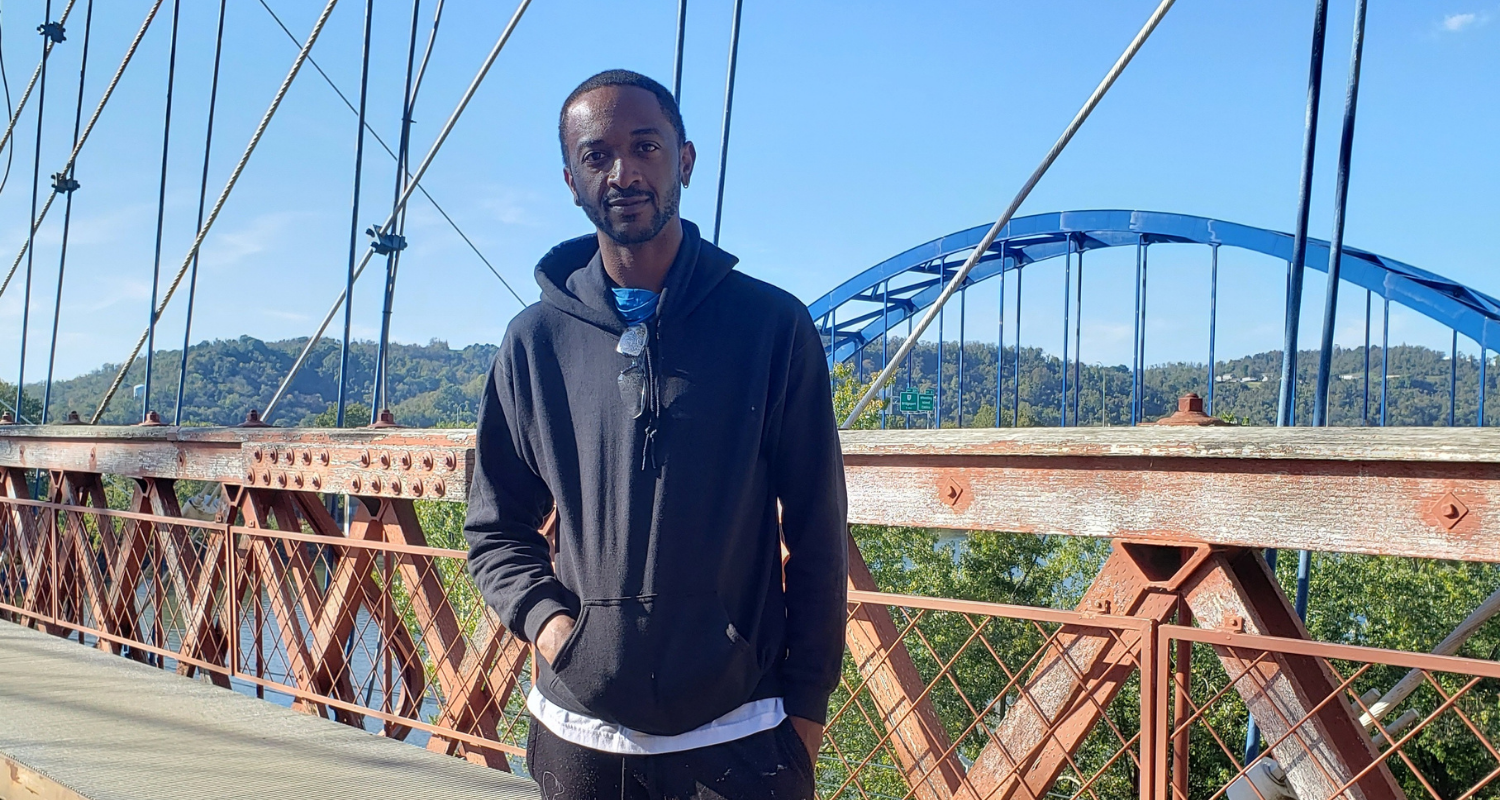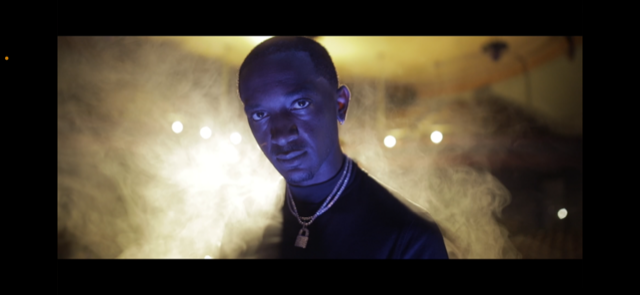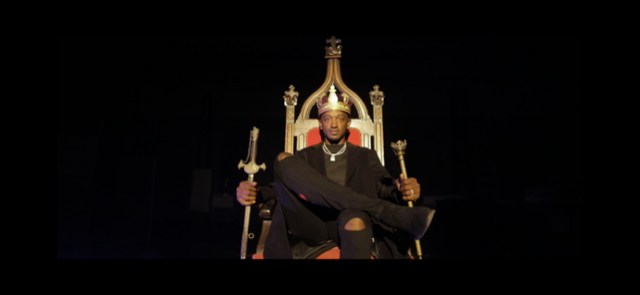Isaiah Alford, artist name “Keez,” has come straight from his day gig at the McClure Hotel with L&L Painting to meet me for an interview at Mugshots cafe. He apologizes for his appearance but is a good sport later about posing for a photograph in paint-splotched pants. Alford has a “come as you are” mentality about life: wherever you are, and whatever you’re doing, be authentic.
Alford wears many hats in the local community—rising rap artist, entrepreneur, community organizer, youth coach, husband, father—and to each of those roles he brings a clearly defined sense of self. A “deep thinker” who “processes everything,” he uses his work to promote a message of unity and mutual understanding. It’s a message he’s honed over a life that—even at the relatively young age of 32—has seen its share of twists and turns. Now he’s ready to set roots down in Wheeling, and he’s here today to tell me why.
A resident of Glen Dale since 2014, Alford was working 60 to 70 hour weeks in car sales right up until the pandemic hit and business plummeted. Between that job and another that took him out of the area for months at a time, he didn’t have much opportunity to get to know the community. The pandemic was “the kick in the butt I needed,” he says, in the sense that it forced him to slow down and to think about what it was he really wanted to be doing.
Alford has been around hip-hop and rap his entire life, but it wasn’t until a little over a year ago that he began seriously contemplating it as a career. His best friend, fellow artist Justin “Vino Bandz” Shaw, heard some of the music Alford was writing as a therapeutic exercise and told him if he didn’t do something with it, he’d regret it. At the time, Alford was processing his thoughts on the murder of George Floyd, attending local protests, and considering how he could be a positive force for change.
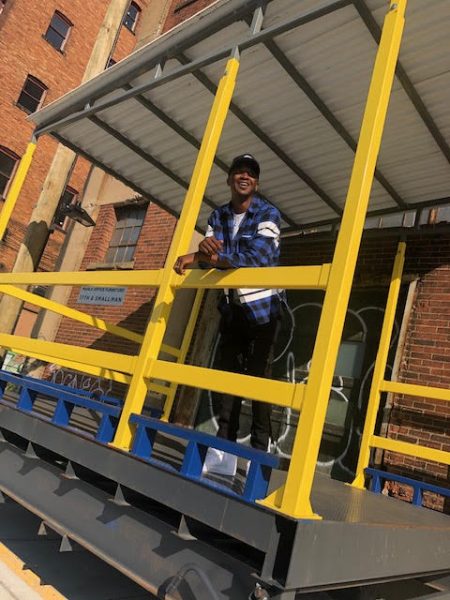
“I can’t do anything for the people in Minnesota here,” he recalls thinking, “but I can affect my area, I can vote in my local elections, and understand and do my research and make sure we put the best people in place there. I can go ahead and… pull some people together and organizations together and do some different things for people in this area. I can do that. We can do that.”
Since then, Alford has been working non-stop to build his profile as both artist and activist. He released his first music video, “Plight,” in November 2020. Filmed at Mt. Wood Overlook, the song provides a window into Alford’s outlook on race relations, including his frustrations about how hard it is for black men to escape the “thug” stereotype: “Some didn’t get to choose a different life/All they know is the seller use drugs/Some make it out to see a different life/just to have it blown out by a slug.”
Mentored by his friend Shaw, Alford writes or records every day and never drops a project without having the next one ready. He released his first CD, “Gifted,” in January 2021, and his second, “Pure Ambition” on his birthday in July. His most recent video, “Black and Proud” was filmed at the Men of Change block party in late August. Holding his six-year-old daughter in his arms, Alford raps about the cognitive dissonance of having pride in black identity misconstrued as “hate for the rest.” He also shows his optimism for the future, juxtaposing the following lyrics with a scene of a diverse group of children playing together at the block party: “They know our culture is contagious/really haters but their children embrace us/just a different generation/these kids just ain’t letting it phase them.”
What Alford likes about music as a medium is that “it’s the best way to be able to convey a message without someone being able to cut it short before you finish.” The problem with public discourse today, he says, is that it’s like the children’s game of Telephone; with so much misinformation on social media, the message gets corrupted. It also fosters an environment where “everyone is talking to be heard, but they’re listening to respond – they’re not listening to hear.”
It’s the socially conscious content of his songs that Alford feels sets him apart from other rap artists working today. A lot of music negatively affects the subconscious, he says: “people don’t listen to the words of the song but because it has these booming 808s and it has all these different frequencies and sounds that keep your attention, now you’re just digesting those words not even knowing what you’re digesting into your mind and your spirit. For me, I want to do right by that power.”
Music is just one of the ways Alford is seeking to open up conversations across racial divides. After having success selling T-shirts at the George Floyd protests, he launched an apparel brand, “Danger-US.” According to Alford the name symbolizes “the real danger of a united society.” He argues that when we begin to separate external differences from basic commonalities, we find out that everyone pretty much wants the same thing: jobs, safe neighborhoods, better schools, and a little entertainment. Those commonalities can be a powerful source of unity – if we decide to channel it.
This sentiment strikes to the heart of Alford’s local community involvement as well. Until recently, he coached football at John Marshall High School, opting for that school because those kids otherwise “might not get to interact with a black male my age, especially not in a positive way.” Beyond the field he continues to foster those relationships because he understands that there’s a “genuine and unique relationship between a coach and a player” and it represents an opportunity to break down stereotypes for the next generation. “You never know what it’ll grow to, that seed you’ve planted,” he says.
Alford has also played a formative role in the civic organization, Men of Change, since its inception in 2020. The group focuses on empowering Wheeling through education and dialogue around issues pertinent to the black community. A series of successful events this summer, including the block party and community bike rides, has set the stage for planning more long-term projects, such as a STEM mentorship program. “We’re learning as we go,” Alford says, noting that they really want to demonstrate that you “don’t have to be anyone special” to do something that brings positivity and change to the region.
Which brings us full circle: Why has Alford decided Wheeling is the place to focus all his creative energy?
Alford, a self-described man of faith, responds in a way that makes it clear he feels God has played a guiding hand in his path. He moved around a lot as a kid, attending 16 different schools before he graduated high school. It was an experience that might have traumatized some kids, but Alford credits his mother with helping him view the changes as opportunities and to become the people-person he is today. Yet while attending college in Martinsburg, Alford found himself being “swayed a lot” and ended up in some jeopardizing situations as a result. One such situation led to a criminal charge for which he was eventually cleared but has nonetheless made it hard for him to pursue certain job opportunities.
As difficutlt as that period was, Alford insists it was a blessing in disguise. While his case was being investigated, he couldn’t leave the state. In a part of West Virginia that requires traveling through Virginia or Maryland to go virtually anywhere, this restriction meant Alford had to stay put in Martinsburg. “It settled me down,” Alford says, and since then everything has been different. It’s even reflected in his rapper name – Keez. During his “wild days,” he went by the nickname “Zeek.” Today he’s Keez because he’s changed direction.
Alford’s desire to put roots down eventually led him to marriage, fatherhood, and Glen Dale, where he’s always spent what little spare time he has with his family. More recently, however, his community work and music endeavors have brought him to the heart of Wheeling and opened his eyes to its potential; he checks off the arena, the waterfront, the casino, and the downtown area as major points in the city’s favor. He’s also impressed by how local organizations and city government are taking the initiative and supporting local artists and entrepreneurs in innovative ways. In this spirit, he wants to be “that spark” that helps promote entertainment in connection with local businesses, and in turn, brings more jobs and revenue to the area.
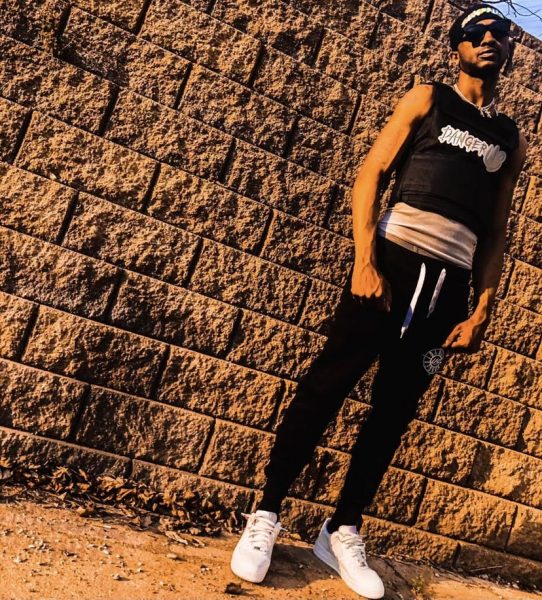
Alford and his family relocated to the North Park area of Wheeling just last weekend to be closer to all the action. But don’t expect the move to slow him down: on November 3, he’s performing in an artist’s showcase at O’fela’s African Lounge in Pittsburgh and he’ll be releasing his third major project, “Dark Times” later in the month. A new video, filmed at the Scottish Rite Temple, drops soon as well.
As it did for so many of us, the pandemic upended Alford’s life and demonstrated the value of family and community in unexpected ways. He hopes, ultimately, that the period of prolonged isolation, rather than sowing further division, helps us to “appreciate this gift that we have of being able to interact with each other.”


